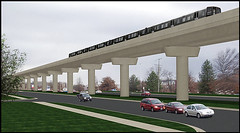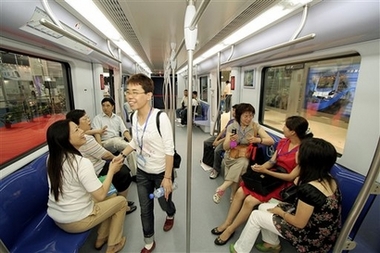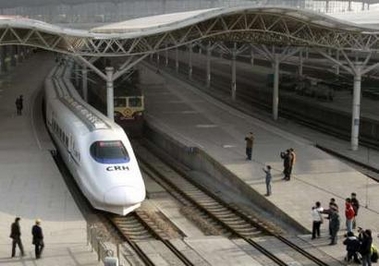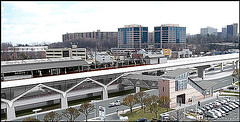System maintenance vs. system change vs. system transformation

First, I don't really care if Tysons Corner doesn't transform into a more urban form, because that will only provide more competition to DC.
But, the issue of underground vs. aboveground subway and the impact on the area is an important one. Certainly, the way that neighborhoods have developed in northeast DC -- east and west of the CSX railroad tracks -- is a case in point. Neighborhoods are separated, just as if they were separated by a freeway. And density is dissipated. Freeway scars through cities are another example.
The Post editorializes in favor of Virginia settling for an above ground subway extension (the Silver Line) because the Post editorial page always leans to "reasonableness" and pragmatism, without really ever striving for greatness. See "Tunnel Vision."
I think columnist Roger Lewis gets it much better, in his Saturday column, "Fairfax County's Metro Mistake Looms Over Tysons Corner." He writes:
A tunnel has been strongly favored by almost everyone except the team of contractors designing the elevated rail line.
How sad to see such a major mistake, one that will persist for generations, being made because of a complicated decision-making process, reticent government leadership, regulatory deadlines and, above all, money. A rail connection to Dulles has been envisioned ever since the airport opened in the early 1960s, making this eleventh-hour mistake even more regrettable. ...
Thus, if tunneling Metrorail through Tysons is truly the right strategy, as many political officials have publicly acknowledged, why not make it happen? After all, this is not a piece of depreciable real estate to be written off in 20 or 30 years, but rather an infrastructure investment meant to serve for a century or more. This project's quality and benefits shouldn't be compromised to save a year, or even to save a few hundred million dollars.
Why have Virginia's political leaders not engaged the White House and Congress in an effort to gain additional time and, if necessary, additional federal money to build the tunnel? Where is the can-do American spirit that produced the Pentagon in less than two years, the beautiful Golden Gate Bridge and the Panama Canal?
Speaking of this, I have been thinking quite a bit about China. The 21st Century demonstrates that the U.S. is on the wane.

Visitors sit on the seats of the latest subway train displayed at the subway exhibition Wednesday, June 13, 2007 in Shanghai, China. China is undergoing a frenzy of subway construction, with more than a dozen cities recently getting approval to build new systems, joining those already in use in major metropolises such as Beijing and Shanghai. Approvals for several more are expected soon. (AP Photo/Eugene Hoshiko)

A bullet train pulls in at a railway station in Shanghai January 28, 2007. The new CRH (China Railway High-speed) bullet train, which has a top speed of 250 kph (155 mph), would cut the journey time on the key Beijing-Shanghai route from nine hours to five, Xinhua News Agency said. REUTERS/Aly Song (CHINA)
Meanwhile in the U.S., the railroad system continues to languish and to save money, the Federal Transit Administration proposes bus rapid transit systems, rather than subway systems.
In the DC region, the jurisdictions have taken from WMATA overall planning responsibility for system expansion, and the jurisdictions--the Dulles system is a case in point--seem to fail to consider broader issues and the regional context.
Instead satisficing and inside deals and political ideology run the roost.
I mention maintenance vs. change vs. transformation in the context of John Friedmann's book Planning in the Public Domain. Most government efforts are designed to keep things mostly the way they are. The Post is a fervent supporter of this at the local level.
Friedmann differentiates between system maintenance, system change, and system transformation (significant change).
Maintenance is about bureaucracy and keeping things as they are. Transformation is about challenging the way things are, by working through political means. But ultimately, all change is about maintaining the political system, which occurs through the integration of change.
At first proposals are radical but get bounded and mediated in the process of getting adopted. In the end, radical becomes bureaucratic. (Reading Friedmann often depresses me because I joke to myself that I am merely working to reduce the most blatant excesses of the system and the Growth Machine.)
Groupthink doesn't serve us very well.

Labels: bad government, civic engagement, good government, media, transportation planning



0 Comments:
Post a Comment
<< Home